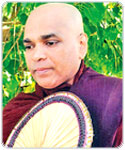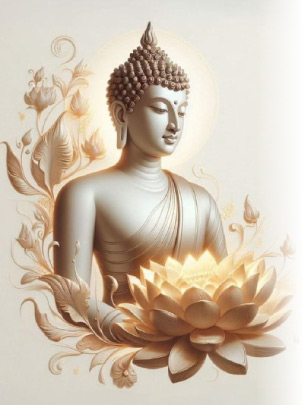|
The noble Buddha Puja
 Dr.
Most Venerable Dr.
Most Venerable
Mirisse Dhammika Nayaka Thero
 “Those
who worship me with flowers, do not venerate me properly. People
who engage in the principles of Dhamma, venerate in the actual
way.” “Those
who worship me with flowers, do not venerate me properly. People
who engage in the principles of Dhamma, venerate in the actual
way.”
(Dhammapadatthakatha – Dhammarama Waththu)
Thousands of bhikkhu congregated around
the Buddha, when it was announced that the Parinirwana of the
Buddha would take place in three months time. In the meantime,
Bhikkhu Dharmarama commenced meditating with the intention of
attaining the Arahathhood before the Buddha Parinirwana happens
Bhikkhu Dharmarama was called when he was inquired why he was
saying away from other bhikkhus and living in isolation, he
answered with all respect. ‘The Buddha, I still have
defilements. I want to attain arahathhood which was sermonized
by you. So, I am following the way as shown.” When further he
said that he was trying to contemplate on the ultimate language
the Buddha hailed him saying ‘Sadu, Sadu’. Moreover, the Buddha
explained that he considered that people who worship him by
offering flowers and incense do not pay the exact homage but
stressed that the highest reverence to him is to engage in
principles of Dhamma. The following stanza of Dhamma was
preached by the Buddha.
“A bhikku would not deteriorate in
obtaining the thirty-seven factors of enlightenment, if he did
meditation on tranquility and insight, comprehended, developed
and practiced Dhamma, devoted to Dhamma, in addition to that,
refreshed the memory he has on Dhamma, quite often.”
This narration on Dhamma is a suitable
Dhamma advice for everybody including you and me. The Buddha
preached the same idea to the bhikkhu Vakkali. Young Vakkali,
who was attracted to the outward appearance of the Buddha,
became a monk with the sole intention of obtaining the privilege
of closely looking at the Buddha. Even after ordaining as he was
continuously gazing at the physical appearance of the Buddha,
the Buddha advised him, not to get attracted to a body consisted
of foulness with thirty two impurities but to contemplate on
ultimate sense. Ultimate sense is synonymous with
Patichchasamuppado: Dependent origination. Many people among us,
engage in material homage, which was not duly admired by the
Buddha but, praised contemplating and following the ultimate
sense. This does not mean that material homage should not be
carried out. It is quite significant to engage in devotional
observances such as offering flowers, lighting lamps and
chanting gatha in order to obtain and enhance faith, and also to
refrain from doing five misdeeds or sins. It also helps as the
first step to follow the virtuous conduct, to concentrate and to
exercise on wisdom to clear the way towards Dhamma and also to
make the mind commie to the way of Dhamma. Although minimum
number of people embark and follow the way which helps to
eliminate the woeful sansara by practicing meditation on insight
as preached by the Buddha, many people halt at paying material
homage. Those who say that they have embarked on practicing
insight, cannot be properly affirmed that they have done so, as
it can be noticed that they have split into various groups in
order to achieve their worldly targets, ambiguously. Among many
Suthra which teach the progress path of Dhamma, Maha Sungnatha
Suthra takes an important role. The following can be seen in the
above suthra.
“Bhikkhu Ananda, I have not seen any
visual body, on which a person is deeply attached with lusty
clinging, that does not make him grief-stricken along with
lamentations and to make him have a melancholy feelings, when
the said body is converted into a different from and change
completely.”
Hence, the Buddha sermonized the four
groups: Bhikkhu, Bhikkhuni and the upasaka and upasika adherents
not to generate thoughts on visual bodies and also not to depend
on sources that make unwholesome defilements, but to live and
strive to eliminate the cankers that are rooted in the
inner-most mind to gain super mundane attainment. For ordinary
people and monks who properly understand the above Dhamma
sermon, firstly, should be virtuous in bodily actions and
speech. This sate of behavior can be called as “Seela”. It is
important to be in a state of seela as this state initiates fear
to do, not only the smallest but also even the minute misdeed
through understanding. The Buddha sermonized in the Sonadanda
Suthra as follows.” The meaning explains as, ‘Wisdom gets
cleansed by seela while seela is purified by wisdom”. Hence, one
who enters the realm of Buddhism either in the state of a monk
or a lay devotee should adequately have to a virtuous behavior:
have a moral excellence in character. For people who practice
customs and traditions related to Buddhism without possessing a
virtuous character and behaviour in ‘Three doors’: mind, speech
and body, can not have proper benefits of paying homage to the
Buddha. It is admirable if the customs and traditions can be
carried out with a proper understanding of the value of having a
virtuous behaviour. Yet, it can be noticed that there are
numerous ‘clinging’s and conflicts’ arising while performing
customs and traditions related to Buddhism, now a days giving
way to cause greed, pride and infatuation. There are people in
the society who say that they offer alms as habitor a custom,
observe sill to fulfill a custom and also perform certain acts
to aquiver merits as to follow customs and traditions.
The genuine homage to the Buddha is to
act in accordance with the ultimate sense preached by him. It is
important to eliminate hindrances such as sensual desire in
order to enthusiastically follow the way to secure the seven
factors of awakening. It is significant to obtain nine chief
kinds of insight knowledge by gaining the knowledge consisting
in contemplation and contemplation of dissolution by starting
from the purification of morality along with maintain all the
stages of purification. Without following the above mentioned
noble path, people whose minds are shaded with deep greediness,
anger, fury, jealousy, and ungratefulness and also people who
always conceal their own misdeeds but repeatedly look for the
mistakes of others with destructive criticism, quite
unfortunately, do not have the opportunity to understand Dhamma.
One should be whole heartedly sincere to oneself. In other
terms, one should be able to relinquish oneself. Relinquishing
does not mean to be neglecting one’s cleanliness and to be
bodily filthy or not taking are of one’s physical health, or
giving up education and profession or abandoning household
activities. All the above mentioned mundane activities should be
done as required within the sphere of a virtuous behaviour in a
peaceful manner. Yet, one’s mind should be accomplished with an
understanding hat the five bundles of aggregates called ‘I’,
always endure on the three characteristics of existence:
Impermanence, suffering and non-self. Moreover, a state of
clinging should not be formed either by one self or through any
external object. While maintaining ‘I’ conventionally, with
keeping the superiority of the Buddha always at the forefront,
Dhamma should be contemplated and memorized to understand that,
according to the real truth, there is actually nobody or nothing
called ‘I’. Hence, ‘the real abandoningoneself’ can be
understood. This state gives rise to willing by restraining the
mind, speech and body to do the five misdeeds and also to do the
ten unwholesome acts. In addition to that, clinging would not
take place for anybody or anything even if they are encountered,
conventionally. This condition would not give rise to conflicts
with anything or anybody you dislike or feel unpleasant of
Gathering of Karmic Volition would be weakened. Mindfulness,
clarity of consciousness, having energy, super mundanepaths,
path for concentration should be understood. A person who was
engaged in external Pujas combined with material homage, for a
long-time in his life-time, would be able to understand what the
genuine homage to the Buddha is, by going through the sermon
preached, regarding DhammaramaThero. |
